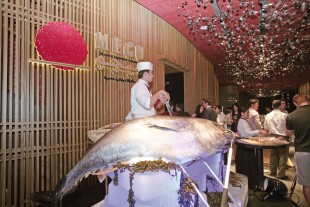

Bringing lifestyle to The Pearl

Walid Malouf, general manager of HDC, the hospitality company for The Pearl in Qatar, outlines his plans for making the island a gem of a dining and lifestyle destination.
Named after a rare and valuable mineral, The Pearl Qatar is aiming to attract equally sophisticated and exclusive residents to the island.
With such discerning clientele in mind, Walid Malouf, general manager of HDC — the island development company’s hospitality division — is cultivating a portfolio of distinguished food and beverage options.
“Since I joined to set up HDC in 2006 our objective has been to bring lifestyle and fun to the island through our hospitality projects,” he says.
So far he has signed six regional partnerships with restaurant brands for the four million m² island reclamation project, which is located 350m offshore of Doha’s West Bay District.
He has strategically avoided big mainstream names in favour of chic brands with a boutique feel. Many hail from Paris or New York, and this cosmopolitan vibe of trendiness and dynamism means that The Pearl’s restaurants go beyond plain food and drink to what Malouf calls “lifestyle offerings”.
“We have signed a mixture of brand partners,” says Malouf. “Some are young brands that are just starting out, some are more established, but they are all bringing freshness and novelty to the area.”
All partnerships are also regional, adds Malouf: “Qatar is relatively small in terms of population and tourism so we have always known that in order to attract people to The Pearl we need to get out of Qatar, so any agreements we sign must have the potential to expand outside of the country and across to other areas of the Middle East and North Africa.”
Providing a spread of dining options across a variety of different price-points is key to making The Pearl work as a leisure destination, says Malouf.
HDC currently runs a branch of the New York-based coffee concept, Chocolate Bar, which costs an average of $15-20 per person; the flagship outlet of the well-established, upper-casual Lebanese dining restaurant, Burj Al Hamam, with a price point of around $50 per person; and the Parisian Chinese restaurant and bar brand Tse Yang, among others.
But its latest and most grand addition is the New York-based Japanese restaurant brand, Megu: “Megu is our flagship restaurant and offers the ultimate Japanese lifestyle dining experience,” says Malouf.
“We have given it the most prominent location on the island; its ceilings are 15m high, which gives a cathedral-like sense of space and incredible loft-type views.
This is a brand which many consider as positioned higher in terms of quality than the likes of Nobu or Zuma, and it certainly is in terms of price. It’s a very expensive but very exquisite dining experience and the food is prepared using only the very best ingredients.”
Malouf has been able to benefit from the experience of other island reclamation projects: “We have learnt from observing other developments that you can create the most beautiful place but if it doesn’t have a sense of community and retail dynamism, whether it is high end or casual dining that you’re going for, it will need to be changed.”
But despite the spread of dining options already on offer, Malouf says that he feels pressure to open the less expensive retail and restaurant options more quickly than was originally planned.
“So far we have only opened the first phase of The Pearl, which is the area where all of the super yachts and big boats are housed. As a result the retail options open at the moment are mostly the upscale and luxurious options.
“However, there is a bigger and growing demand for more casual dining options with lower price points from families with small children — they’re looking for something priced at around AED100-150 (US$27 – 40), instead of AED200-250 ($54-68).
“Although trendy and expensive places are welcomed, we have realised we now need to speed up the development of those more affordable dining options.”
Although political unrest across the region has put pressure on food prices, Malouf says that it is the fixed costs of staff salaries, accommodation and transportation that worry him more: “It’s tricky to manage because you are caught between wanting to provide a great service experience and wanting to control costs.
For me that is more pressing that the food costs, which are variable; if you don’t have guests then you aren’t paying it. But your staff are going to be there anyway whether you have one guest or 100 guests.
This is an added pressure that you don’t have in Europe where people are paid by the hour — no-one works by the hour here.”
In contrast to Dubai, Malouf says Doha is pitched at business traffic more than tourists: “Doha is attracting more business tourism, in particular cultural and sports tourism,” he says.
“Obviously the win to host the football world cup in 2022 was its biggest success, but Qatar is hosting around 85 to 100 international calibre sporting events every year and these fill the hotels.”
With such potential for growth and such cherry-picked dining options, The Pearl looks set to establish itself as a gem of an F&B destination.